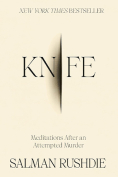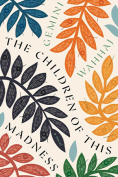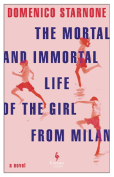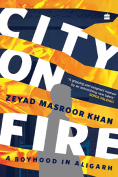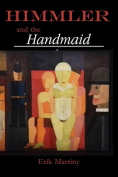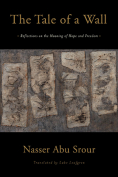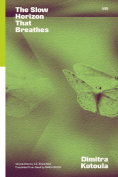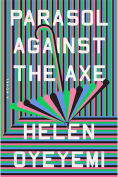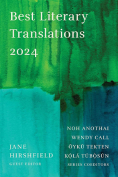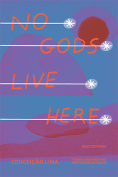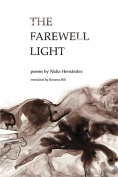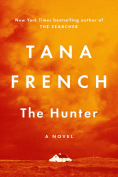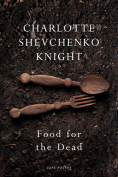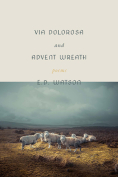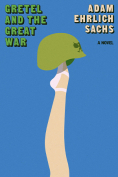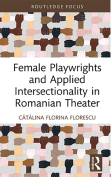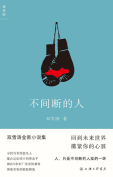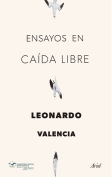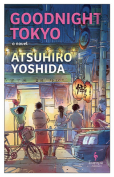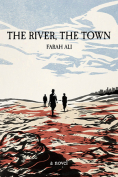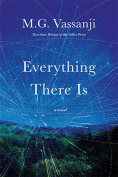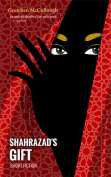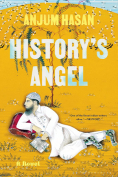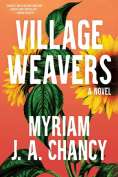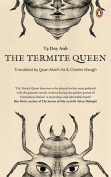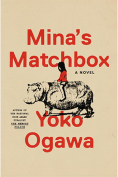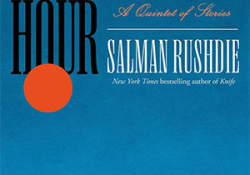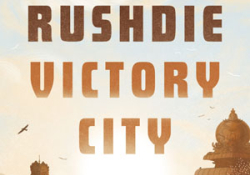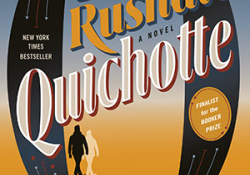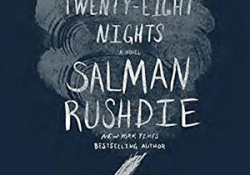Knife: Meditations after an Attempted Murder by Salman Rushdie
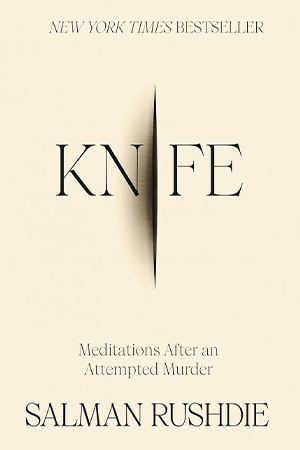 New York. Random House. 2024. 224 pages.
New York. Random House. 2024. 224 pages.
Knife is the highly anticipated autobiographical account of Salman Rushdie’s experience of being stabbed onstage just when he was about to deliver a lecture at the Chautauqua Institution in New York on August 12, 2022. While the broad outlines of this shocking event have been widely publicized in the news media, Rushdie’s account is able to elevate this event and its aftermath to a more intimate and philosophical reflection.
Knife is an exceptional memoir, not only in its account of the author’s encounter with an assassin who stabbed him brutally, leaving him breathing artificially through a ventilator, and eventually losing an eye and an arm, but because it is ultimately a narrative of courage and survival. Throughout his intricate detailing of his physical and psychic injuries, Rushdie is deeply grateful for his recovery and his extraordinary good luck in coming out of this near-death experience still able to think, write, and live.
For Rushdie, the incident of stabbing at Chautauqua marks, in a way, an end to his hard-won return to normalcy in New York achieved decades after the 1989 fatwa by the Iranian spiritual leader Ayatollah Khomeini for charges of blasphemy committed in writing the novel The Satanic Verses. That event forced Rushdie into many years of hiding under the tight watch of British state security. Eventually, Rushdie moved to New York City and gradually resumed a normal life, believing that the death edict was no longer an imminent threat. This sense of normalcy was rudely dissipated by the events of August 12.
Rushdie is deeply grateful for the people who resisted the assassin, including Henry Reese, his friend who was about to interview him on stage. Reese sustained injuries while confronting the assassin, but he inspired other audience members to eventually physically overpower the assassin. Rushdie provides vivid details of the immediate aftermath of seeing himself bleed on stage to the hospital, scenes his brain registered in a state of semiconsciousness. His deepest gratitude is reserved for his wife, the poet Rachel Eliza Griffiths, who rushed to be at his side and remained with him steadfastly in the long road to recovery. The memoir is in part a love letter to his wife. He openly admits his checkered romantic past but is finally grateful to have found Eliza and developed a strong bond with her in the years preceding the attack. Rushdie also provides glimpses of other important relationships that sustained him during these travails: his relationships with his two sons, Zafar and Milan, and his sister Sameen.
Rushdie infuses many of his very serious medical issues with a wry sense of humor. There is no shying away from unpleasant physical problems like urinary catheters, but he does present his doctors and therapists as humane and compassionate, even when some prescriptions have unexpected side effects. Overall, Rushdie displays a lot of patience with his own disabilities and a perseverance to regain as much function as possible.
The near-death experience does not change his established beliefs. He remains committed to atheism and an opponent of religion in the public sphere. He also remains an ardent advocate for free speech. His own travails solidify his previous support for the Charlie Hebdo cartoonists, who had offended zealots and prompted assassinations. After an arduous three-month-long recovery, he resumes writing and decides to tell his own story.
While recounting the story of his own brush with mortality, Rushdie weaves in many other stories of writers of his generation who are also confronting illness or accidental injury. Among those mentioned in detail are his friends Paul Auster, Martin Amis, and Hanif Kureishi. The first two passed away, and Kureishi is still coping with debilitating injuries from a fall. Rushdie also remembers other writers who have been targeted by Islamic fundamentalists, like the Egyptian novelist Naguib Mahfouz, who faced a similar knife attack for his long-ago support of free speech and Rushdie’s own work.
One of the most interesting chapters in the memoir is Rushdie’s imaginary dialogue with his assassin, which is rendered almost like a miniature play. Rushdie tries to argue with his assassin that there are other ways of receiving his work than in the manner the assassin has been conditioned to think about Rushdie, without even reading any of his works. The memoir ends with Rushdie and Eliza revisiting Chautauqua, not only the stage where he was attacked but also the prison where the assassin is currently jailed. This journey provides him with a measure of closure. Rushdie decides to let things in the justice system take their course without obsessing about outcomes.
Rushdie remains a powerful storyteller. Even when working with nonfictional material, he transforms his personal story into something universal that resonates with anyone involved with artistic endeavor. He infuses personal stories with intimate details and emotions but also steps away to create a fellowship with other writers and artists. He is a deeply learned writer, his work steeped with literary references spanning languages and periods. Yet he avoids being pedantic and presents himself as a complex, fallible, and entirely relatable protagonist.
Lopamudra Basu
University of Wisconsin–Stout

